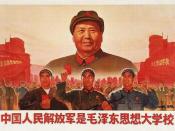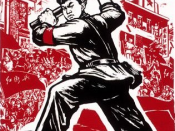Breaking with Old Ideas is a product of Chinese Community Party chairman Mao Zedong's concept of a new world in which all social relationships are transformed. Li Wen-Hua made the film during the last years of the Cultural Revolution in the PRC, People's Republic of China. The film dramatizes the struggle for proletarian control of education at an agricultural college during the Great Leap Forward and makes it clear that the leading party members can still promote bourgeois ideas and only the masses can rectify these leaders to ensure that education truly helps to build socialism. Breaking with Old Ideas shows an introduction to the politics of the Great Leap Forward and the Cultural Revolution with concrete examples of how class struggle continues under socialism and how communists can wage that struggle successfully by mobilizing the masses to criticize those in positions of authority taking the capitalist road.
Mao launched the Cultural Revolution during his last decade in power to renew the spirit of the Chinese revolution.
"We must reform the arts faculties in the universities. The students must go down and engage in industry, agriculture and commerce" (201, Reader), said Mao. Mao shut down China's schools, and during the following months he encouraged Red Guards to attack all traditional values and "bourgeois" things and to test party officials by publicly criticizing them. Mao believed that this measure would be beneficial both for the young people and for the party cadres that they attacked. Breaking with Old Ideas show how Mao's program works and encourages low class peasants to do the same.
"[Breaking with Old Idea is about] a teacher whose spectacles and manner suggest he is a backward element undergoes a late but speedy conversion to the cause of educational popularization. Such changes, however, were but sideshows to...


